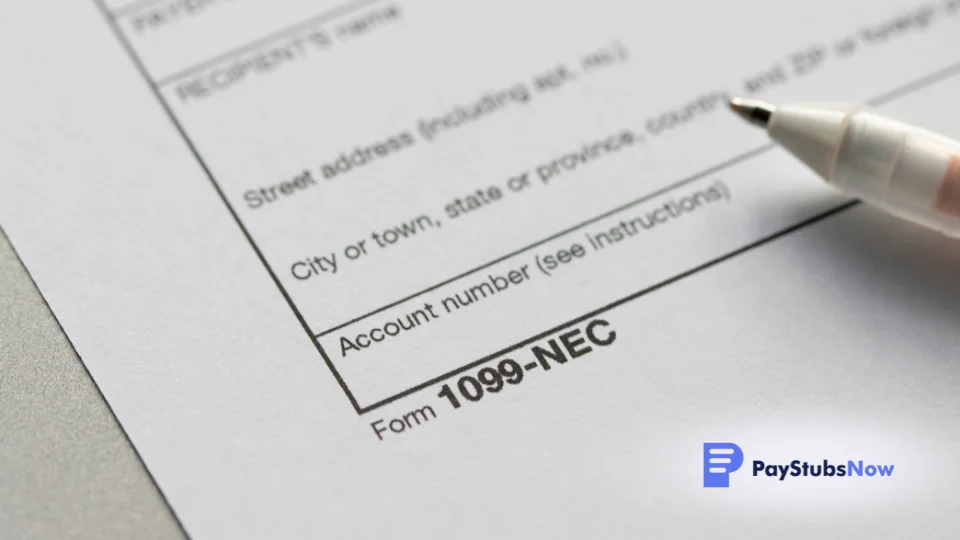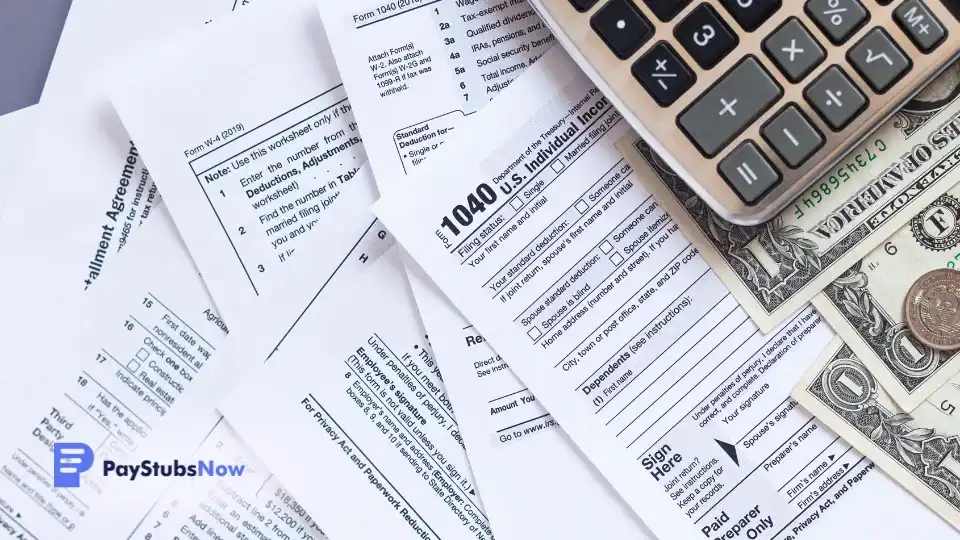How To Report Cash Income: Understanding Legal Obligations
Reporting cash income might seem like a task and a half, but understanding your legal obligations is crucial to staying out of hot water.
In this blog post, we will break down everything you need to know about documenting cash income, from IRS guidelines to practical tips for tracking your earnings to maintaining detailed records.
We'll also learn how using a service like Paystubsnow makes generating formal income documentation a breeze. Let’s jump in!
Here Is What You Should Know When Reporting Cash Income:
- Accurate reporting of cash income is essential to avoid legal issues with the IRS.
- Identifying all sources of cash income ensures comprehensive and compliant tax reporting.
- Maintaining meticulous records of your cash earnings and expenses helps simplify the filing process.
- Filing timely and accurate tax returns is vital to staying on the right side of the law.
- Innovative tools like Paystubsnow can streamline the creation of formal income documentation, making compliance easier.
Understanding Cash Income

When it comes to cash income, understanding what constitutes it is important.
Cash income refers to any earnings received in the form of cash rather than through direct deposits or checks. Here are some examples of what constitutes cash income:
- Tips: Common in the service industry, such as waitstaff or hairdressers.
- Freelance Payments: Paid in cash for work done on a project basis, often seen in creative fields.
- Business Transactions: Cash payments received directly for goods sold or services rendered.
These familiar sources of cash income are prevalent in various sectors like the gig economy, where platforms like Uber or TaskRabbit facilitate numerous cash-based transactions. Regardless of the source, tracking and reporting all cash income is crucial to comply with legal obligations and avoid surprises with the IRS.
What Does the IRS Consider "Self-Employment Income"?
The IRS considers "self-employment income" to include earnings from activities where you carry on a trade or small business as a sole proprietor, an independent contractor, a member of a partnership that carries on a trade or business, or otherwise in business for yourself (including a part-time business).
This includes payments for services such as corporate director fees and fees received for professional services (e.g., notary public, election precinct official), along with earnings from gigs or freelance work.
Essentially, if you're working for yourself, even on the side, the income generated from that activity is considered self-employment income by the IRS. As a self-employed individual, you are also required to pay self-employment tax.
Legal Obligations for Reporting Cash Income

Understanding the legal obligations regarding cash income is essential to avoid trouble with the IRS. Here’s what you need to know:
- Under federal tax law, all income must be reported, irrespective of the form in which the recipient receives it, including cash income from jobs, tips, or side gigs.
- Businesses and individuals must report income over $600 from a single-payer on Form 1099-NEC (for non-employee compensation).
- Even without a Form 1099, you must still report the income on your tax return.
Consequences of Non-Compliance
Ensuring accurate reporting of all cash income helps avoid these severe consequences and maintain compliance with federal tax obligations:
- Penalties: The IRS can impose significant tax penalties for underreporting income, up to 20% of the underreported amount.
- Interest: Any unpaid tax due to unreported income will accrue interest from the due date of the return until you pay the tax in full.
- Legal Issues: Failing to report cash income can lead to tax evasion charges and felony offenses. Convictions can result in fines and even imprisonment.
How To Report Cash Income

Understanding how to report cash income properly is crucial for staying compliant with tax laws. Let’s walk through the essential steps to accurately and legally document your earnings.
1. Identify All Cash Income Sources
To accurately report your cash income, you must identify all the sources from which you receive cash. These could be:
- Freelance Work: You should account for any side gigs or freelance projects for which you receive cash.
- Tips and Gratuities: Service industry workers, including the tips you receive directly from customers.
- Sales and Rentals: Income from selling goods at flea markets, garage sales, or renting out a property.
- Service Fees: Payments received for providing services such as tutoring, babysitting, or lawn care.
- Gambling Winnings: Any paid cash won from gambling activities, even small amounts.
- Barter Transactions: You should note the fair market value of anything received in exchange for your services or goods.
- Small Business Income: Cash transactions from day-to-day business operations, including side businesses.
Keeping track of these different income sources ensures that everything runs smoothly, you stay compliant, and you avoid legal headaches.
2. Include Cash Income on Your Tax Return
Come tax season, including your cash income on your tax return is non-negotiable. Here's how to do it effectively:
- Report on Form 1040: You should report cash income on your Form 1040, whether self-employed or receiving additional income from tips, side gigs, or freelance work.
- Use Schedule C: If you're self-employed, use Schedule C (Form 1040) to report profits and losses. This form allows you to deduct business expenses, offsetting your taxable income.
- Include Specific Earnings:
- Gambling winnings: Reported on Schedule 1, line 8b.
- Rental income: Report interest, dividends, or rental income if it applies to you.
- Gig economy income: Driving for a rideshare service or renting out your property must be reported regardless of whether you receive a Form 1099-K or not.
- Document All Income Flows: Maintain detailed records of all cash received, as this becomes crucial in case of an IRS audit.
Remember, transparency and meticulous record-keeping will keep you compliant and stress-free come tax season.
3. Deduct Valid Business Expenses
When earning cash income, deducting valid business expenses is crucial in accurately reporting and reducing your taxable income. Here’s how you can ensure you’re on the right track:
- Maintain Detailed Records: Maintain receipts and documentation for every business expense, including materials, office supplies, utilities, and business-related travel costs.
- Know What's Deductible: According to IRS guidelines, you can deduct the cost of goods sold, business expenses like rent or home office space, car expenses if used for work, and marketing costs.
- Separate Personal and Business Expenses: It’s vital to distinguish between personal and business expenses. Use separate bank accounts and credit cards for business transactions to avoid mix-ups.
- Track Car Expenses: If you use your vehicle for business purposes, you can either deduct the actual cost or use the standard mileage rate provided by the IRS.
- Hire a Professional: Consult with a tax professional to ensure you claim all eligible deductions without violating tax laws.
By diligently tracking and reporting your business expenses, you can significantly reduce your taxable income, keeping more hard-earned money in your pocket.
4. File Accurately and On Time
Filing your taxes accurately and on time is critical to avoid penalties and interest charges. Here's how to ensure you stay compliant:
- Double-Check All Figures: Make sure you correctly report all cash income. Double-check your math to avoid errors.
- Use the Correct Forms: Use IRS Form 1040 to report your income. If you're self-employed, consider Schedule C for business income and expenses.
- Meet Deadlines: Mark important tax deadlines on your calendar. Most individual tax returns are due by April 15th; if you need an extension, file Form 4868 for an additional six months.
- Keep Detailed Records: Ensure you have all supporting documentation, such as receipts, invoices, and logs of cash transactions.
- Get Professional Help: Consult a tax professional to ensure your filings are accurate and complete.
Tips for Managing and Tracking Cash Income

With the right tips and tricks, you can easily stay on top of your earnings and meet all reporting requirements. Let's explore some practical strategies to help you manage your cash flow well to ensure everything is in order when it's time to file your taxes.
Leverage Financial Software
Using financial software simplifies cash income reporting and provides peace of mind by keeping your financial records accurate, up-to-date, and compliant. By integrating these tools, you can focus more on growing your business and less on administrative tasks.
Here are some practical ways to implement this:
- Automate Record-Keeping: Financial software can automatically update and store your income records, reducing the risk of errors.
- Generate Comprehensive Reports: Easily create detailed financial reports to help you understand your cash flow and prepare for tax season.
- Organize Receipts and Invoices: Digital tools enable you to upload and organize receipts and invoices, making documentation effortless.
- Set Reminders for Tax Deadlines: Many financial software options can remind you of important tax deadlines, ensuring timely filing.
- Integrate With Other Tools: Most financial software interfaces with banking and payroll systems to create a seamless financial management experience.
Accurately Report All Income
Making sure you accurately report all cash income is crucial for complying with tax laws and avoiding potential legal troubles. Here are some practical steps to ensure you're reporting all your cash income correctly:
- Track Daily Earnings: Keep a daily log of cash earned, noting the date, amount, and source of the income.
- Use Invoices and Receipts: Issue receipts for every cash transaction and keep copies for your records.
- Separate Personal and Business Finances: To avoid confusion, maintain distinct accounts and records for personal and business transactions.
- Review Bank Statements: Regularly compare your cash logs and bank deposits to ensure consistency.
Maintain Excellent Record-Keeping
Keeping an excellent record of all your transactions is essential when it comes to reporting cash income. Not only does it simplify the filing process, but it can also protect you in case of an audit or discrepancies. Here are some practical tips to keep your records in top shape:
- Use a Dedicated Notebook or Digital Tool: Make sure tolog every cash transaction, including the date, amount, and purpose.
- Keep Receipts and Invoices: Store physical or digital copies of any cash income and expenses documentation.
- Organize Regularly: Set aside time each week or month to categorize and update your records to prevent backlog.
- Create a Back-Up for Your Records: Use cloud storage or an external drive to protect your records from physical damage or data loss.
- Stay Consistent: Develop a routine that you stick to, ensuring accuracy and completeness. Consistency simplifies tracking and reviewing.
Seek Professional Financial Advice
Consulting with a certified public accountant (CPA) or a tax advisor can simplify the process. While you could also work out your own finances, professionals stay updated on IRS guidelines and can offer personalized advice for your situation. Consulting a professional can save you time and mitigate the risk of costly errors. Their expertise ensures that you're fully compliant with all legal obligations.
Here's how you can implement this tip effectively:
- Schedule a Consultation: Find a licensed CPA or tax advisor and book an initial consultation. Explain your situation and ask specific questions about your cash income and tax obligations.
- Prepare Documentation: Gather all your cash income records, receipts, and related expenses before meeting with the advisor, as this helps them provide accurate recommendations.
- Follow Professional Guidance: Implement the advice you receive, including updating your record-keeping methods, adjusting your tax filings, or setting aside funds for tax payments.
- Review Annually: Regularly review your financial situation with your advisor to stay compliant and adjust as needed.
Simplifying Cash Reporting With Paystubsnow
Understanding and meeting your legal obligations for reporting cash income doesn't have to be complicated. By keeping diligent records and leveraging a platform like Paystubsnow, you can confidently manage your finances and navigate tax season with ease.
With Paystubsnow, you can:
- Generate accurate pay stubs and 1099 forms in minutes. No more scrambling for documentation or worrying about mistakes.
- Stay compliant with IRS regulations. Paystubsnow ensures your income is reported accurately, minimizing the risk of audits.
- Save time and reduce stress. Ditch the time-consuming paperwork and focus on growing your business or personal finances.
Our user-friendly platform is easy to use as it provides all the necessary tools to report your income accurately.
Don't wait until the last minute. Create a 1099 and simplify your cash reporting starting today!

